- Home
- Naguib Mahfouz
Respected Sir, Wedding Song, the Search Page 18
Respected Sir, Wedding Song, the Search Read online
Page 18
“Don’t make matters worse,” Halima pleaded.
“I’ll bring destruction on this house,” Tariq shouted, “and everyone in it!” Whatever excitement I could have felt had receded. All I could muster was scorn and indifference, but before I could express anything, Halima told Tariq to take his clothes and get out.
“Behind my back!” he yelled. “In this filthy house!”
“It’s your presence that makes it filthy,” came my rejoinder, in so calm a tone that it sounded very strange in this stormy atmosphere. He didn’t bother to look at me.
Then Halima asked Abbas, “Is it true, what he says?”
“We’ve reached an understanding,” said Mama’s boy.
“Why weren’t you considerate enough to consult us?” I said with lofty indifference and, getting no response, went on: “Will her salary be sufficient for running a home?”
“I’m going to take your place as the company’s prompter.”
“From author to prompter?”
“There’s no inconsistency between the two.”
“My son’s gone mad!” cried Halima convulsively. Then she told Tariq, “Don’t you act like a crazy fool, too.”
He began making threats again, whereupon she yelled, “Get out of our house!”
“I’ll stay here until Doomsday!” came his parting shot. Exit Tariq, leaving the scene to the Noble Family. I looked maliciously from one to the other, enjoying myself.
“I don’t even know her except as this or that person’s mistress,” Halima said to Abbas, imploring him to reconsider.
I roared with laughter. “Your mother’s an expert. Listen and take note!”
She went on pleading with him. “Your father, as you well recognize, has become a good-for-nothing. You’re our only hope.”
“We’ll begin a new life,” said Abbas.
I laughed. “Why have you deceived us all this time with your high-flown morality?”
Abbas strode out, and she broke into sobs. In the depths of my heart I would welcome his final departure, exulting over the collapse of the alliance between him and his mother against me. His had always been a dissenting voice, and I was fed up with him. Let him leave, and the house would become calm and harmonious. I’d even been afraid of him at times. He personified the meaning of words I hold in contempt, the nature of acts I abhor.
Halima was bewailing her fate. “Alone! Alone!”
“Alone! Don’t pretend to be what you are not. In what way are we different? The same source, the same life, the same final goal!”
She stared at me with eyes that spoke loathing and contempt, then went to her room, with my loud, disdainful laugh following her all the way.
I look at her back over the mounds of peanuts, melon seeds, popcorn, and dried chickpeas heaped up in their bins along the counter. What kind of existence is this, so totally joyless, in this atmosphere laden with smoke and aversion? The boy’s return and his success should have been enough to give her new life.
For once, I was really feeling quite cheerful, while Halima was hiding her gloom.
Sirhan al-Hilaly had been asking, “Where are Tariq and Tahiya?”
“A severe shortage of players,” said Salim al-Agrudy.
I laughed. “Exciting news, Sirhan Bey: my crackpot son has married Tahiya.”
The whole table burst out laughing. “It appears,” said Ismail, “that your son is a real artist.”
“The kid,” exclaimed al-Hilaly.
“The marriage of the season!” added Shalaby.
“You’ll now find Tariq,” said Ismail, “wandering in the desert, like Magnun Layla.”*
The table burst out laughing again.
“But Halima isn’t joining in our happiness,” observed Sirhan.
“Halima is at a funeral,” she said, and went on mixing drinks.
“Who knows? Perhaps he’s found the happiness that evades the rest of us.”
“In spite of everything!” I laughed out loud.
“These days only mules are lucky enough to be happy,” Halima said bitterly.
“Will he go on trying to write plays?” said Sirhan.
“Of course,” Halima replied.
“Great. Tahiya will be able to supply him with lots of useful experience.”
After that I became absorbed in collecting the money. It was the first night I’d done business with no one to spy on me and I thoroughly enjoyed it.
—
The woman is out searching for her son. Alone in the shop, I wonder what kind of end he’s assigned her in the play. I forgot to ask about that. Has he lowered the curtain over the time we spent in prison? Over this shop? Customers come one after another. These people don’t realize how much I despise and detest them. Hypocrites! They carry on exactly the same way we did, then offer up prayers at the proper times. I’m better than they are. I’m liberated. I belong to the good old days, before religion and moral behavior became all the rage. I’m besieged in this shop, though, by an army of hypocrites, every man and woman. The state, too. That’s why it neglects the sewers, leaves us to line up in queues, and deluges us with bombast. And my son gives me a splitting headache with his silent reprimands, then commits betrayal and murder. If only I could get hold of a little opium. It would make everything bearable. Why were we so beguiled at the time of our engagement? Why did it whisper to us so insinuatingly of a sweetness that didn’t exist?
“I am indebted to Amm Ahmad Burgal for a joy that is almost more than a man can bear.”
“Don’t exaggerate.”
“Halima, who can be happier than a man whose heart has not beaten in vain?” Her radiant smile was like a flower in full bloom.
Where does she hide this sweetness now?
Ah, if only it were possible to go back in time as it is to go back in space. Somewhere in my primeval being is a soft spot that makes me want to cry over these ruins. Somewhere a Karam who no longer exists is weeping over the Halima of the past.
The woman has returned. She comes in and sits down without even a nod at me. I ignore her completely, and she doesn’t speak, but her eyes look serene. What has she found out? She’s no doubt withholding good news from me, the sow: if it were bad news she’d have poured it over my head the minute she came in. Has Abbas returned? I refuse to ask. Several minutes pass before she says, “We’re invited to see the play!” She hands me a printed notice.
My eyes come to rest on the name of the author: Abbas Younis. I’m carried away with pride. “Shall we go?”
“What a question!”
“We may get a shock when we see ourselves.”
“What matters is that we see Abbas’s play,” she says. “My heart tells me that the playwright is bound to appear.”
“Who knows?”
“My heart knows.”
We do our best to look presentable: I wear a suit that isn’t too bad, and Halima has rented a tailleur from Umm Hany. At the theater they receive us graciously.
“But I don’t see the playwright,” Halima says.
“He didn’t come,” says Sirhan al-Hilaly, “but I’ve told you enough.” So she’s met him and managed to get considerable news from him.
Since we’re early, we go to see Amm Ahmad Burgal, who gives us each—on the house—a sandwich and a cup of tea. “It’s like old times,” he remarks, but we neither smile nor comment. At curtain time we take our seats in the front row. The theater is packed.
“It’s a success,” observes Halima.
“You can’t judge until a week’s gone by.” Despite the ironic detachment I feel—how can I take a play seriously when life itself does not mean anything to me?—my nerves are on edge.
Ah, the curtain is rising—to reveal our house. Our house, no other. Was it al-Agrudy or Abbas who wanted it this way? The father, the mother, and the son. A brothel and a gambling den, that’s what it is. There’s more than crime and betrayal there. The stage mother is an uncontrollable whore, her relations with the director, the producer, th
e critic, and Tariq Ramadan follow one after another: and I look swiftly at Halima, whose breath is coming in rough gasps. It’s sheer hell. Now you can wallow in your son’s opinion of you. What he thinks of his father and mother is painfully clear. Who would have imagined that his serene head could hold all this devastation? I’m glad he sees his mother this way, glad he’s come out with what he really thinks of her. This piece of drama is his way of wreaking vengeance on me, punishing me for what I am.
But in this moment of scandal I experience a sense of triumph over both the mother and the son, over my two mortal enemies. He doesn’t understand me. He presents me as someone fallen, a man who has resorted to corruption in reaction to the challenge of reality. I’m not like that, you fool. I never had any stature to lose. I grew up untamed and free, watching the hypocrites, learning from them. That’s what you cannot understand. What’s the secret of your success? You flatter them, you pander to their sense of superiority. I spit on you and your evasions!
Thunder of wild applause.
We’re invited—as is customary—to the party in the cafeteria, in celebration of a successful play. “Shall we join them or leave?” I whisper.
“Why shouldn’t we join the party?” It’s no use pretending to be above it all, Halima. You don’t have the same wings I have. “He didn’t need to commit suicide,” she murmurs.
“What kind of an end did you expect for a murderer?” I ask, hoping to nettle her.
“He got a lot of sympathy.”
Sirhan al-Hilaly declares loudly, “My intuition says that it won’t be a flop,” and they begin drinking toasts.
“It’s brutal, of course,” says Salim al-Agrudy, “but it’s impressive.”
“It reminds the audience of their everyday hardships,” says Fuad Shalaby. “But it’s terribly pessimistic.”
“Pessimistic?” scoffs al-Hilaly.
“He needn’t have committed suicide. The audience’s hopes and aspirations were all pinned on him.”
“Don’t look at it as a suicide,” answers al-Hilaly.
“It’s just a way out for the new generation.”
“God protect all bastards!” roars al-Hilaly. And turning to Tariq Ramadan, he raises his glass and says, “To the revelation of a great actor, discovered in his fifties!”
“A discovery more significant,” Fuad Shalaby exclaims, “than finding an oil well!”
Al-Hilaly turns to us for a response, but I anticipate him and raise my glass. “A toast to the absent playwright.”
A surge of acclaim turns into a riot of drinking at the theater’s expense. I revel in scandals recalled about every man and woman present. Why were we the only ones imprisoned? Friends, libertines—drink a toast to me! I am your true symbol!
When we return to the old house, it is dawn and we have no wish to sleep. I light the charcoal in the heater in the hall, where the tiles are covered by an old Assiut rug, and Halima and I sit down, as if, in spite of our mutual aversion, we want to be together for a while. Which of us will start the conversation? How very difficult it is for us to talk to each other. We are always on guard.
“Did you like the play?” I ask.
“Very much. Very much.”
“And the subject?”
“What a silly question from someone who’s spent a lifetime in the theater!”
“Why do we always deceive ourselves? There’s no doubt about what he intended.”
“I won’t accept this silly way of thinking!”
“It was even more true than the real facts.”
“There’s no connection between the way I appear in that play and the real facts.” I can’t help chuckling at that, which annoys her. “It’s just a fantasy.”
“All of them just as we know them in real life?”
“An author is free to do as he likes, to keep some characters as they are in real life and change others, as he wishes. There were completely new elements in the plot.”
“Why did he portray you as he did?”
“That’s his business.”
“I thought he loved and respected you!”
“There’s no doubt about that.”
“You give yourself away with that bitchy look of yours!”
“I know I’m right.”
“Even Tariq!” I say with contempt. “I never imagined you’d sink to such depths.”
“Spare me your filthy thoughts.”
“If it hadn’t been for your fun and games on the side we’d have made a lot more money.”
“What about you? The fact is that he shows you much better than you really are, which proves that he really was using his imagination.” I laugh so loudly that she says, “Quiet! People returning from dawn prayer will hear you.”
“So what? That strange boy of yours. He threw us into prison.”
“How can you expect anyone to lead a decent life? You don’t follow any rules but your own.”
“But he claimed to be so perfect. That’s what gave me a pain in the neck!”
“He’s a wonderful boy. A well-known playwright. My son.” Outwardly, at least, she’s pleased with things.
“What I admire is his brutality!”
“When he comes back I’m going to leave this damn house and live with him.”
“This house? Where every room bears witness to our past glory?”
She leaves me, and I sit there alone holding my hands over the heater. I’d like to know more about my father. Was he one of these hypocrites? He died young, my mother sank very low, and I grew up her way, under the devil’s horns. But you, Abbas, are a dark horse.
How bored I am! I’m like a jinni shut up in a long-necked bottle. No room to maneuver.
I follow the play’s success with fascination, expecting the playwright to surface, even to come up with a new play, hoping that his success will change the course of my tedious life.
I make frequent visits to the theater to nose around for news; and one morning as I enter Amm Ahmad Burgal rushes up to me and takes me into the empty cafeteria. His downcast face alarms me. I sense that behind it lies bad news.
“Karam! I was just about to come see you.”
“Why! What’s wrong?”
“Abbas.”
“What about him? Say it, Amm Ahmad.”
“He disappeared from the pension in Helwan, the place where he was staying, and he’s left a strange message behind.”
“What message? Don’t you want to tell me?”
“A note, saying he was going to commit suicide.”
My heart sinks, pounding, like anyone else’s. We look at each other silently. “Have they found…?”
“No,” he says. “A search is being made, though.”
“Ah. Probably…who knows? But he wouldn’t have written the note, would he, if he hadn’t…?” My mouth says the words, my thoughts are astray.
“May the Lord help you.” He sounds like someone who believes the matter is ended.
“I must go to Helwan!”
“Sirhan Bey al-Hilaly has already gone.”
A futile, painful trip. There is nothing but the suicide note. Abbas has vanished, disappeared once and disappeared again. Finding his body will be the only proof of his suicide. Would he have written the note if he hadn’t really made up his mind to commit suicide?
“If he really wanted to commit suicide,” al-Hilaly muses, “why didn’t he do it in his room?”
“So you doubt the seriousness of his intentions?”
“Yes, I do.”
I do not return to the old house until evening. Halima isn’t there and I realize that she’s gone to the theater to find out why I’m so late. I close up the empty shop and sit in the hall waiting for her. An oppressive hour goes by before she comes in, her eyes ablaze with madness. We gaze at each other for a second, then she cries, “No! Even if he wanted to kill himself he wouldn’t do it! He couldn’t! He couldn’t kill himself! It’s not possible!”
Sinking into a sofa, she bursts into wild tear
s, slapping her cheeks with both hands.
* * *
*Refers to the theme of a love lyric by Gameel (d. 701), a poet from Medina. Magnun was the self-immolating lover and Layla his ever-inaccessible inamorata.
Halima al-Kabsh
From the bowels of prison, born again to the face of the earth! Abbas’s face appears before me, and I take him in my arms. Weighed down by shame and humiliation, I bury my face in his chest. “How badly we’ve treated you,” I whisper. “I wish we’d died. Then you’d be rid of us.”
“It’s only your words that hurt me,” he answers gently. I can’t help weeping. “We should be thankful now,” he says. “Let’s think about the future.”
“You’re all alone, son. God has seen fit to take away your wife and child,” I say, shaking with sobs, “and we weren’t there to comfort you.”
“What’s past is past.”
With his father he scarcely exchanges a word. We are all together in the hall of the old house the way we used to be, sometimes, in the old days.
“I beg you not to bring up the past,” he says. Then, pausing for a moment, he goes on: “I’ve been thinking things over. Does Father want to go back to his old job in the theater?”
“No. Never, damn them!”
“I can turn the reception room into a shop. We’ll sell some of the furniture and set up a snack shop. It’s an easy business and fairly profitable. What do you two think of that?”
“Just as you see it, son,” I say with gratitude. “And I pray to God that I may hear good news about you soon.”
“I hope so. I think I’m about to come up with a winner.”
I invoke God’s blessing on him over and over, until he says, looking at us from one to the other, “What matters most is that you cooperate with each other and that I don’t hear things that hurt me.”
“I have often dreamed of living with you,” I say with a sigh.
“If God means me to be successful, everything will change.”
“Why don’t you go ahead and take her with you!” Karam says, growling.
“You must cooperate with each other. I’ll do all I can to give you a decent life, but you must learn to get along together.”

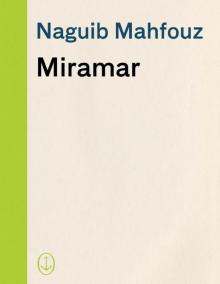 Miramar
Miramar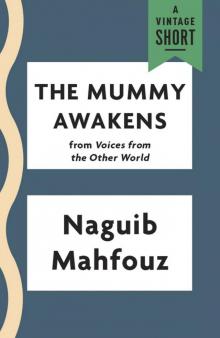 The Mummy Awakens
The Mummy Awakens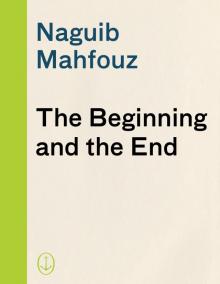 The Beginning and the End
The Beginning and the End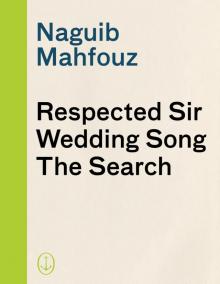 Respected Sir, Wedding Song, the Search
Respected Sir, Wedding Song, the Search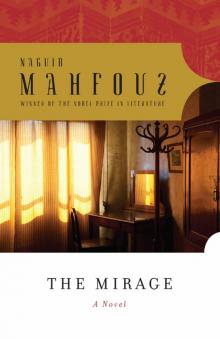 The Mirage
The Mirage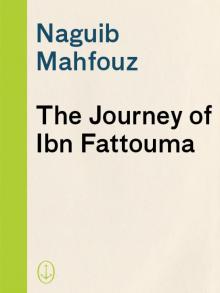 Novels by Naguib Mahfouz
Novels by Naguib Mahfouz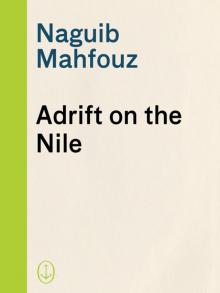 Adrift on the Nile
Adrift on the Nile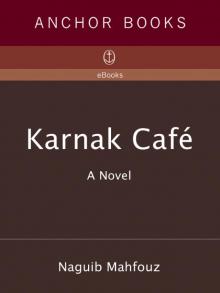 Karnak Café
Karnak Café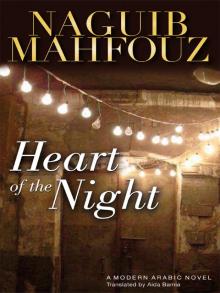 Heart of the Night
Heart of the Night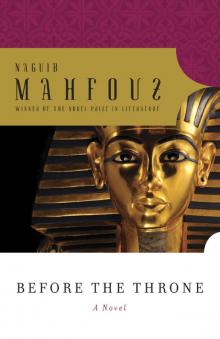 Before the Throne
Before the Throne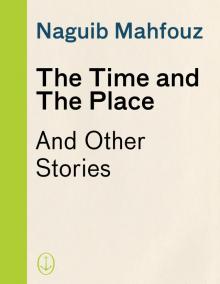 The Time and the Place: And Other Stories
The Time and the Place: And Other Stories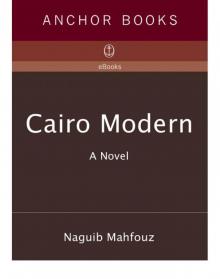 Cairo Modern
Cairo Modern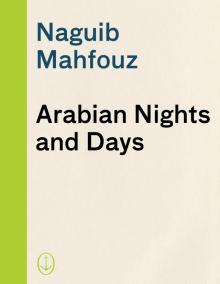 Arabian Nights and Days
Arabian Nights and Days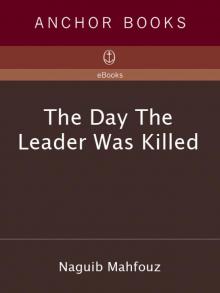 The Day the Leader Was Killed
The Day the Leader Was Killed Morning and Evening Talk
Morning and Evening Talk Three Novels of Ancient Egypt Khufu's Wisdom
Three Novels of Ancient Egypt Khufu's Wisdom Akhenaten: Dweller in Truth
Akhenaten: Dweller in Truth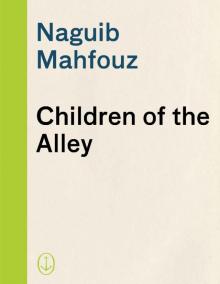 Children of the Alley
Children of the Alley Voices From the Other World
Voices From the Other World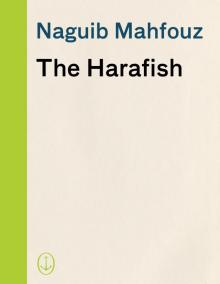 The Harafish
The Harafish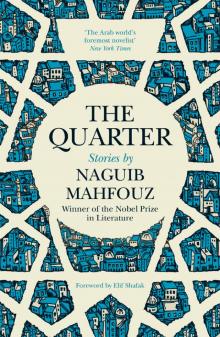 The Quarter
The Quarter The Seventh Heaven: Supernatural Tales
The Seventh Heaven: Supernatural Tales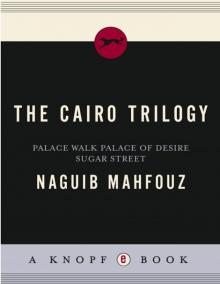 The Cairo Trilogy: Palace Walk, Palace of Desire, Sugar Street
The Cairo Trilogy: Palace Walk, Palace of Desire, Sugar Street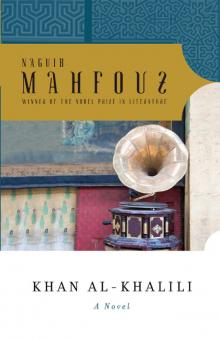 Khan Al-Khalili
Khan Al-Khalili Three Novels of Ancient Egypt Khufu's Wisdom, Rhadopis of Nubia, Thebes at War
Three Novels of Ancient Egypt Khufu's Wisdom, Rhadopis of Nubia, Thebes at War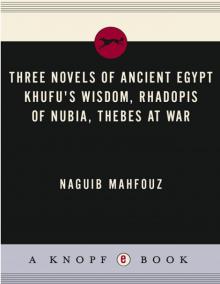 Three Novels of Ancient Egypt
Three Novels of Ancient Egypt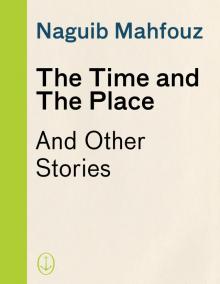 The Time and the Place
The Time and the Place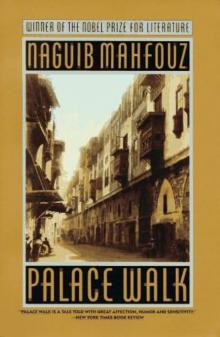 Palace Walk tct-1
Palace Walk tct-1 Akhenaten
Akhenaten The Seventh Heaven
The Seventh Heaven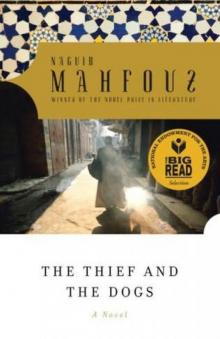 The Thief and the Dogs
The Thief and the Dogs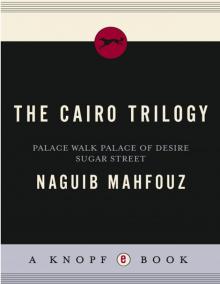 The Cairo Trilogy
The Cairo Trilogy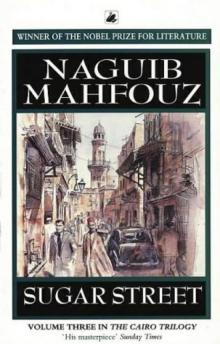 Sugar Street tct-3
Sugar Street tct-3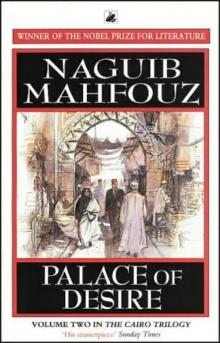 Palace of Desire tct-2
Palace of Desire tct-2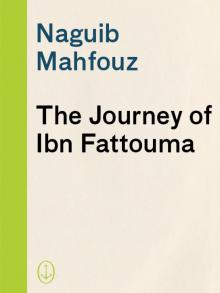 The Journey of Ibn Fattouma
The Journey of Ibn Fattouma